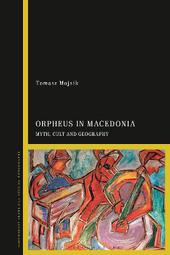
|
Orpheus in Macedonia: Myth, Cult and Ideology
Hardback
Main Details
| Title |
Orpheus in Macedonia: Myth, Cult and Ideology
|
| Authors and Contributors |
By (author) Dr Tomasz Mojsik
|
| Physical Properties |
| Format:Hardback | | Pages:224 | | Dimensions(mm): Height 234,Width 156 |
|
| Category/Genre | Ancient religions and mythologies |
|---|
| ISBN/Barcode |
9781350213180
|
| Classifications | Dewey:292.213 |
|---|
| Audience | | Tertiary Education (US: College) | |
|---|
| Illustrations |
5 bw illus
|
|
Publishing Details |
| Publisher |
Bloomsbury Publishing PLC
|
| Imprint |
Bloomsbury Academic
|
| Publication Date |
15 December 2022 |
| Publication Country |
United Kingdom
|
Description
The mythological hero Orpheus occupied a central role in ancient Greek culture, but 'the son of Oeagrus' and 'Thracian musician' venerated by the Greeks has also become a prominent figure in a long tradition of classical reception of Greek myth. This book challenges our entrenched idea of Orpheus and demonstrates that in the Classical and Hellenistic periods depictions of his identity and image were not as unequivocal as we tend to believe today. Concentrating on Orpheus' ethnicity and geographical references in ancient sources, Tomasz Mojsik traces the development of, and changes in, the mythological image of the hero in antiquity and sheds new light on contemporary constructions of cultural identity by locating the various versions of the mythical story within their socio-political contexts. Examination of the early literary sources prompts a reconsideration of the tradition which locates the tomb of the hero in Macedonian Pieria, and the volume argues for the emergence of this tradition as a reaction to the allegation of the barbarity and civilizational backwardness of the Macedonians throughout the wider Greek world. These assertions have important implications for Archelaus' Hellenizing policy and his commonly acknowledged sponsorship of the arts, which included his incorporating of the Muses into the cult of Zeus at the Olympia in Dium.
Author Biography
Tomasz Mojsik is Associate Professor at the University of Bialystok, Poland.
ReviewsAn intriguing case-study in how myth subserves politics and constructs "Hellenicity," this meticulous monograph demonstrates convincingly that the shamanic singer Orpheus was a crucial figure when Greeks - in particular, ambitious but marginalized Macedonians - staked out claims about the origins of their culture. -- Richard P. Martin, Antony and Isabelle Raubitschek Professor in Classics, Stanford University, USA
|